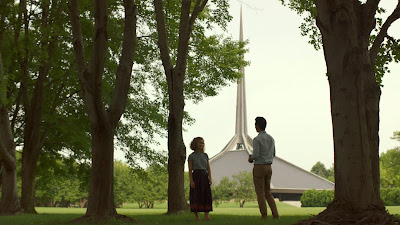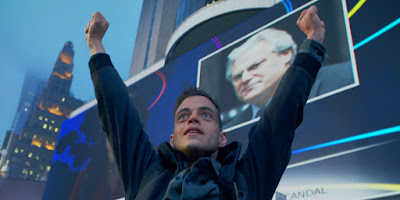Movie Review: Columbus
Spawning from the various inklings of renowned visionary directors like Stanley Kubrick, Wes Anderson, and Yasujiro Ozu, the first dive into major filmmaking for video essayist Kogonada found itself in the solemn and intellectual Columbus. The first film I've ever seen that truly worked to bridge the gap between the themes of architecture and a young adult's coming-of-age, Columbus quickly grappled onto my attention, not only through its premise and superb performances, but also through its captivating setting of the so-called 'architectural mecca' of Columbus, Indiana.
After his estranged architect father suddenly falls ill during a speaking tour, his reluctant son Jin (John Cho) finds himself stranded in the small confines of Columbus, Indiana, a city celebrated for its abundant examples of modernist architecture. As Jin slowly explores the city, he encounters a young woman named Casey (Haley Lu Richardson), an architectural enthusiast who has lived in Columbus with her mother almost her entire life. With their paths intertwined, the two develop a unique friendship that challenges not only their thoughts on the town and its vibrant atmospherics, but their perspectives on each other as well.
After a year full of sensational independent features, from hip-hop chronicles in Patty Cake$ and jailbird hijinks in Good Time to vibrant coming-of-age tales in Lady Bird, there remained a number of unique films that rode the borderline between fading into nothingness and becoming some of my favorite films of 2017. One film in particular, which struck my interest after receiving a welcoming round of acclaim from critics across the board, was Columbus. The debut feature from renowned video essayist Kogonada, the Columbus, Indiana-set drama teased a soft, sincere coming-of-age premise, with the backdrop of a compelling, minimalist cityscape just waiting to be uncovered. Anchored by an equally passionate and perplexing cast, led by veteran John Cho and semi-newcomer Haley Lu Richardson, Columbus traversed familiar ground, all while delivering a moving portrait of culture and friendship like no other.
While most Columbus' acclaim might come from its wonderful performances by both Cho and Richardson, the element that most attracted me to the film had to be the unexplored avenues of Columbus. A Midwestern city set off in a part of the United States I've yet to venture (but would surely like to now), the film's title hinted at some hidden oasis of modernist remnants. With a well-established reputation behind it, spawning creations from famous modernist designers like Eero Saarinen and Harry Weese, the town gave the film a near-perfect backdrop for what was quite the minimalist drama. With the aesthetic appeal of its various churches, banks, and homes never overwhelming the audience, in effort to distract us from the central plot of a blossoming friendship, the role of the film's architecture played an essential part in making Columbus what it is -- a carefully-crafted and contemplative journey through its characters' view on the world around them.
These central characters, played in hushed perfection by John Cho and Haley Lu Richardson, brought their own distinct voices to the film, each mixing fluently with the ambiguous background beyond them. With Cho entering the film as a man whose lost most of his enthusiasm to a dead-end job and the overwhelming expectations of his architect father, we see right from that start how his character's stubborn hostility towards his father and to the subject of architecture will conflict the ideals of Richardson's Casey. As Casey's sheltered ambitions to create and discover begin to spill into the affairs of Cho's Jin, we see a unique friendship spawn from indifference. This friendship ultimately led the two actors -- one a veteran of delivering charming and sincere performances, the other a newcomer who has just begun to make a name for herself on the big screen -- to fill the screen with enough compassion and soul to go around.
Overall, with its thoughtful direction by Kogonada paying homage to the critic and essayist's favorite filmmakers while altogether defining his own individual eye for cinema, Columbus at its surface was an artful delight for any film -- and architecture -- aficionado. Beneath that surface, however, the film stood as a dynamic and soulful study of its fulfilling setting, but even more, its radiant characters. Flourished by a captivating performance in John Cho, and a forceful and profoundly promising turn for Haley Lu Richardson, Columbus made for a exceptional debut from a filmmaker I'm eager to see again.
I gave Columbus an 8 out of 10 for its artful cinematography and direction, which combined with two sensational leading performances to craft a smart, at times humorous, film that delved into the complex correlations between culture, family, and unexpected friendship.
After a year full of sensational independent features, from hip-hop chronicles in Patty Cake$ and jailbird hijinks in Good Time to vibrant coming-of-age tales in Lady Bird, there remained a number of unique films that rode the borderline between fading into nothingness and becoming some of my favorite films of 2017. One film in particular, which struck my interest after receiving a welcoming round of acclaim from critics across the board, was Columbus. The debut feature from renowned video essayist Kogonada, the Columbus, Indiana-set drama teased a soft, sincere coming-of-age premise, with the backdrop of a compelling, minimalist cityscape just waiting to be uncovered. Anchored by an equally passionate and perplexing cast, led by veteran John Cho and semi-newcomer Haley Lu Richardson, Columbus traversed familiar ground, all while delivering a moving portrait of culture and friendship like no other.
While most Columbus' acclaim might come from its wonderful performances by both Cho and Richardson, the element that most attracted me to the film had to be the unexplored avenues of Columbus. A Midwestern city set off in a part of the United States I've yet to venture (but would surely like to now), the film's title hinted at some hidden oasis of modernist remnants. With a well-established reputation behind it, spawning creations from famous modernist designers like Eero Saarinen and Harry Weese, the town gave the film a near-perfect backdrop for what was quite the minimalist drama. With the aesthetic appeal of its various churches, banks, and homes never overwhelming the audience, in effort to distract us from the central plot of a blossoming friendship, the role of the film's architecture played an essential part in making Columbus what it is -- a carefully-crafted and contemplative journey through its characters' view on the world around them.
These central characters, played in hushed perfection by John Cho and Haley Lu Richardson, brought their own distinct voices to the film, each mixing fluently with the ambiguous background beyond them. With Cho entering the film as a man whose lost most of his enthusiasm to a dead-end job and the overwhelming expectations of his architect father, we see right from that start how his character's stubborn hostility towards his father and to the subject of architecture will conflict the ideals of Richardson's Casey. As Casey's sheltered ambitions to create and discover begin to spill into the affairs of Cho's Jin, we see a unique friendship spawn from indifference. This friendship ultimately led the two actors -- one a veteran of delivering charming and sincere performances, the other a newcomer who has just begun to make a name for herself on the big screen -- to fill the screen with enough compassion and soul to go around.
Overall, with its thoughtful direction by Kogonada paying homage to the critic and essayist's favorite filmmakers while altogether defining his own individual eye for cinema, Columbus at its surface was an artful delight for any film -- and architecture -- aficionado. Beneath that surface, however, the film stood as a dynamic and soulful study of its fulfilling setting, but even more, its radiant characters. Flourished by a captivating performance in John Cho, and a forceful and profoundly promising turn for Haley Lu Richardson, Columbus made for a exceptional debut from a filmmaker I'm eager to see again.
I gave Columbus an 8 out of 10 for its artful cinematography and direction, which combined with two sensational leading performances to craft a smart, at times humorous, film that delved into the complex correlations between culture, family, and unexpected friendship.






Comments
Post a Comment